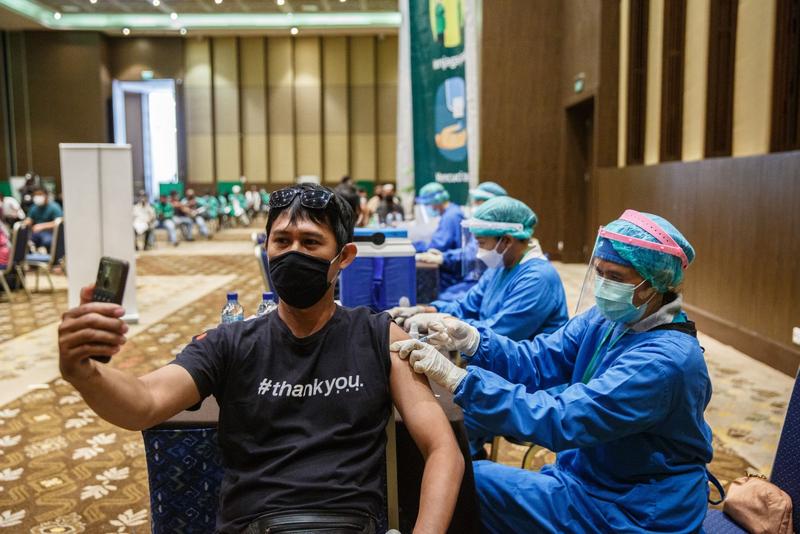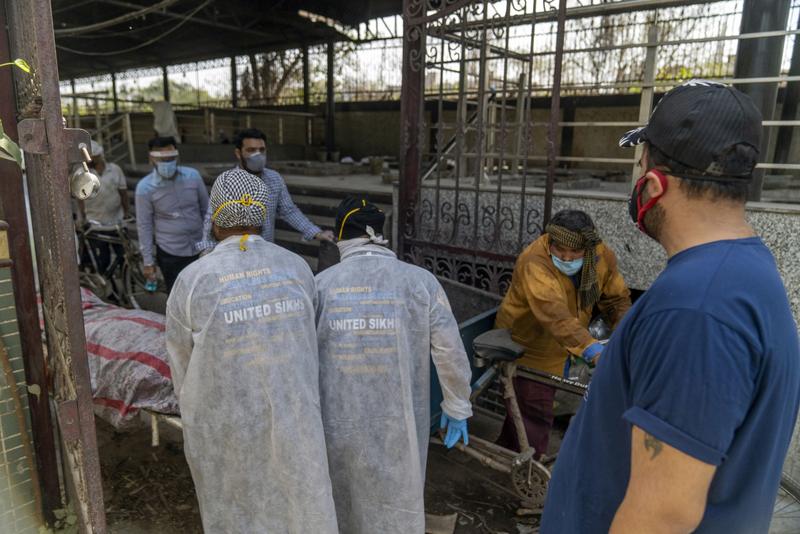 A healthcare worker administers a dose of the Sinovac vaccine in Bali, on Feb. 28. (BLOOMBERG)
A healthcare worker administers a dose of the Sinovac vaccine in Bali, on Feb. 28. (BLOOMBERG)
The world is fast becoming ever more reliant on China for vaccines, with India’s raging virus outbreak stifling its ability to deliver on supply deals, even as the US tries to position itself as a champion of wider access.
Over the past few weeks, leaders of some of the globe’s most populous nations have sought more shots from China. Demand is expected to rise even further if the World Health Organization, as expected, authorizes vaccines from China’s Sinovac Biotech Ltd and Sinopharm Group Co Ltd, allowing developing countries in Asia, Africa and Latin America to access them through Covax, the global vaccination effort.
“China has become not just the largest exporter,” said Yanzhong Huang, a China specialist and senior fellow for global health at the Council on Foreign Relations. “In many countries it has become the only option.”
China’s reliability as a vaccine supplier is increasing its geopolitical clout at a time when the US and the EU have been slow confronting the global pandemic as Covid hot spots rage out of control in India, Brazil and elsewhere. Compounding the difficulties, India’s crisis has dried up vaccine supplies and prompted many countries to turn toward China. Amid this backdrop, the US, for months preoccupied with its domestic vaccination push, has come under intense criticism for hoarding shots at the expense of a global response.
Covid-fighting arsenal
President Joe Biden made it clear this week that the US intends to start playing a more active role. On Wednesday, the US threw its weight behind a movement to waive patents on Covid-19 vaccines to allow other countries to manufacture them. He’s vowing that the US will become an “arsenal for fighting Covid-19” globally as outbreaks elsewhere in the world risk spawning dangerous variants that could prolong the crisis. The administration’s efforts so far include plans to give away 60 million doses of AstraZeneca Plc’s shot and to ramp up production of doses made by Moderna Inc, Pfizer Inc and Johnson & Johnson.
In the meantime, countries from Uruguay to Senegal to Indonesia have few places to turn apart from Beijing.
China has already shipped out about 240 million doses, more than all other nations combined, and has committed to providing another 500 million, according to Airfinity Ltd, a science information and analytics company. India, the world’s third-biggest supplier after China and the European Union, had exported 67 million doses to nearly 100 countries until the devastating Covid-19 outbreak prompted it to halt most deliveries in recent weeks.
The WHO is weighing data on Chinese vaccines before a decision on clearance, which is expected in days or weeks. Access to the shots will provide a boost to the WHO-backed Covax effort, which relied heavily on the Serum Institute of India before the clampdown on exports.
 Workers carry the body of a deceased Covid-19 patient into a crematorium in New Delhi, on May 4. (SUMIT DAYAL / BLOOMBERG)
Workers carry the body of a deceased Covid-19 patient into a crematorium in New Delhi, on May 4. (SUMIT DAYAL / BLOOMBERG)
Covax has shipped more than 50 million doses to 121 countries and territories, well short of its goal and just a fifth of what the US has administered domestically. A new pact with Moderna has expanded Covax’s portfolio, but only a fraction of the 500 million doses it pledged will be available this year.
WHO authorization of Chinese vaccines could make an immediate difference for governments waiting for that stamp of approval before giving them to citizens. Sri Lanka, for instance, has so far used less than 1 percent of its 600,000 Sinopharm shots on foreign Chinese workers.
Some experts, though, are worried about the potential public-health impact of widely deploying Chinese vaccines that have demonstrated lower efficacy rates than those made Pfizer and Moderna. And Chinese shots have already been hampered by a lack of trial data and a preference for vaccines from the Western companies.
Foreign Minister Wang Yi vowed last week that China would provide vaccines to countries that had been dependent on India during a call with counterparts from South Asian nations.
Last month Chinese President Xi Jinping vowed to oppose “vaccine nationalism” in a call with Indonesia leader Joko Widodo, whose government green-lit Sinopharm for emergencies soon afterward. Indonesia also secured as many as 15 million more shots of Sinovac.
“In plain view, India’s export ban has made Indonesia increasingly dependent on vaccine supplies from China,” said Pandu Riono, an epidemiologist at the University of Indonesia.


